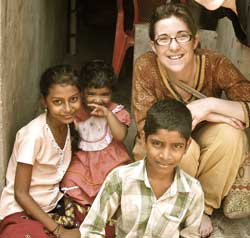Caitlyn in India - Kids & Health
Caitlyn, Tamil Nadu, India
Caitlyn always had a ‘thing’ for all things India –  but it took an ELI volunteer placement to turn her fascination into real-life experience. As an ELI volunteer, Caitlyn was able to live and work in the country of her dreams, forge professional connections and use the experience as a kind of a test run for future work in India. Today, this anthropology PhD student from Washington is back again in southern India, putting together the finishing touches on the first chapter of a research project on pregnancy and women’s health. Although she organized her current stay in India on her own, Caitlyn credits her previous stint as an ELI volunteer for giving her the contacts and the confidence to work again in India. As she wraps up her data gathering in Tamil Nadu, Caitlyn graciously welcomes questions from prospective ELI volunteers and offers “been-there-done-that” advice to new ELI arrivals in India.
but it took an ELI volunteer placement to turn her fascination into real-life experience. As an ELI volunteer, Caitlyn was able to live and work in the country of her dreams, forge professional connections and use the experience as a kind of a test run for future work in India. Today, this anthropology PhD student from Washington is back again in southern India, putting together the finishing touches on the first chapter of a research project on pregnancy and women’s health. Although she organized her current stay in India on her own, Caitlyn credits her previous stint as an ELI volunteer for giving her the contacts and the confidence to work again in India. As she wraps up her data gathering in Tamil Nadu, Caitlyn graciously welcomes questions from prospective ELI volunteers and offers “been-there-done-that” advice to new ELI arrivals in India.
“What I always tell people at the beginning is to relax,” she says, recalling her first days in India when her mind was awash with the overwhelming, and constant, jumble of impressions. “The heat, the colors, the smells: so many things affected my senses.” Even though she’d traveled quite a bit, Caitlyn was struck by the very differentness of India. “I think of India as our world but turned totally inside out.” For some volunteers, the intensity of culture shock sometimes leads to frustration. Caitlyn recommends – just chill. “My advice would be to work on being receptive and learn to go with the flow. Accept that you don’t have as much control as you do at home. Be receptive, not aggressive.”
To help her integrate, Caitlyn didn’t exactly go native in India – but she did learn some Tamil and dressed the way local college women do: tunic-length tops and what she calls, comfy pants. “It’s really the best thing to do – don’t bring a lot from home. The clothes here are light, they wash and dry easily, they’re pretty. And they’re a sign that you respect the local culture. They make you look less alien. Dressing traditionally helps build rapport.”
Figuring out what it is you want from volunteering is also crucial. “Everyone has this idea that they want to ‘make a difference,’ but I’d say, let go of the idea that you’re going to accomplish something major. Instead, be creative. Focus on what you can offer the community.” Caitlyn discovered that yoga – something she’d been doing at home for years – was a great way to reach the disabled children she worked with at PCTC. “I learned the Tamil names for some of the common poses, like ‘cat,’ ‘cow’ or ‘down dog’ and did yoga with the kids. They loved it.”
Caitlyn also incorporated into the classroom some simple but fun art activities she remembered from her own childhood. “Looking back, I wish I’d come more prepared,” she says today. It’s a common insight from ELI volunteers: homework pays off. Don’t automatically assume you will be ‘trained’ – some volunteers find themselves alone in a classroom full of kids. So if you’re looking to work in an orphanage, or with disabled children, or teach English to little ones, do some research before you leave home. Simple games, songs and activities - stuff you yourself may remember from preschool - are a great way to teach, entertain and build relationships with your young pupils. It’s funny but true: children on the other side of the planet may remember you for the rest of their lives just because you taught them ‘Head, Shoulders, Knees and Toes.’
During her first stint in India, Caitlyn also volunteered at an Indian hospital which gave her invaluable insights into the local health education and overall health care system; a factory visit offered a glimpse into working conditions for millions of people. As she traveled and volunteered, Caitlyn made professional contacts that opened doors and gave her helpful introductions. She created a base from which she’s building her career as a scholar and researcher.
“People here are very welcoming, so I encourage volunteers to take advantage of all the opportunities that come their way. I know it can be hard, [you’re] in your early 20s and maybe a little shy because you’re in this strange place.” But for Caitlyn there’s a solution. “Relax, be open, and then put yourself out there.”
Sounds like a good mantra for all ELI travelers.
Interviews
- ARGENTINA - HIV
- BRAZIL - Wildlife
- BRAZIL - Wildlife
- CAMBODIA - Buddhist Monks
- CAMBODIA - Children
- CAMBODIA - Microfinance
- CHILE - Literature
- CHILE - Equine Therapy
- CHINA - Journalism
- CHINA - Urban Planning
- ECUADOR - Medical
- ECUADOR - Teaching
- ECUADOR - Physical Therapy
- ECUADOR - Veterinary
- ECUADOR - Youth
- GHANA - Orphanage
- GUATEMALA - Teaching
- INDIA - Women's Programs
- INDIA - Health & Youth
- INDIA - Journalism
- INDIA - Women's Empowerment
- IRELAND - Art Gallery
- IRELAND - Art
- IRELAND - Law
- IRELAND - Museums
- IRELAND - PR
- IRELAND - Veterinary I
- IRELAND - Veterinary II
- MEXICO - Youth
- NEPAL - Construction
- NEPAL - Orphanage
- NEPAL - Orphanage
- NEPAL - Veterinary
- NICARAGUA - Teaching
- NICARAGUA - Unwed Mother Support
- PERU - Teaching
- PHILIPPINES - Nutrition
- PHILIPPINES - Nutrition
- PORTUGAL - Fighting Food Waste
- PORTUGAL - Housing for the Poor
- SOUTH AFRICA - Public Health
- SOUTH AFRICA - Public Health
- SOUTH AFRICA - Engineering
- SOUTH AFRICA - Nutrition
- THAILAND - Elephant Camp
- THAILAND - Elephant & Medical
- THAILAND - Journalism
- THAILAND - Physical Therapy
- UGANDA - Medical
- UGANDA - Medical
- UGANDA - Medical
- UGANDA - Microfinance
- VIETNAM - Pharmacy
- VIETNAM - Women

